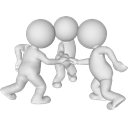Social Skills

Social skills are the skills we use to communicate and interact with each other verbally and non-verbally through gestures, body language, and our appearance.
Developing social skills is about being aware of how we communicate with others, the messages we send, and how methods of communication can be improved to make the way we communicate more efficient and effective.
- Social skills are goal-directed
- Socially skilled behaviors are interrelated in the sense that one person may use more than one kind of behavior at the same time for the same goal
- Social skills should be appropriate to the situation of communication
- Different social skills will be used for professional and personal communication
- Social skills can be identified as certain types of behavior whereby an individual can be judged on how socially skilled they are
- Social skills can be taught, practiced, and learned
- Social skills should be under the cognitive control of the individual - learning them involves learning when to use particular behaviors, as well as what behaviors to use or how to use them
There are many reasons why a person may have a social skills deficit. It could occur because of a lack of knowledge, such as the inability to acquire new skills or a competency deficit.
Sometimes, the person may know how to perform the social skill, but they may struggle because of limited practice or inadequate feedback.
There may also be internal or external factors that interfere with the person performing the social skill, such as anxiety or chaotic surroundings.
Basic Communication Skills
These include the ability to listen, follow directions and refrain from speaking.
For example, listening skills involve the ability to concentrate and ignore distractions.
Good listening skills are demonstrated through indicating attention, such as nodding, smiling, and giving feedback on what has been said or discussed.
It also includes the ability to refer to past comments, such as tying a current statement to a previous one or query about potential future ideas, actions, and events.
Basic communication skills include body language and behaviors, like eye contact, physical stillness, and emotional attentiveness while the other person is talking.
Empathy and Rapport Skills
Certain cognitive, behavioral, and mental health conditions may limit an individual’s ability to feel empathy and connect with others.
This includes Autism, documented social impairments, and Borderline Personality Disorder.
Those who suffer from severe social anxiety and those who are highly self-conscious may display too little or too much focus on someone else.
This means that some people with anxiety are desperate to please others and avoid confrontation, so they will pay close attention to what others say or always volunteer to help or do favors.
Opposite, some people will feel overwhelmed by their social environment and shut down around others.
Interpersonal Skills
Interpersonal skills include sharing, joining activities, asking for permission, and waiting for turns.
Those with a social skill deficit may struggle to ask fundamental and concise questions.
Unable to ask a simple question creates barriers to obtaining information and initiating a conversation.
Those who struggle to ask questions will appear disinterested and even anti-social.
Those with poor social skills may prefer to ask closed questions because these elicit brief and controlled responses.
Adults with limited social skills may struggle to understand proper manners in different social contexts and settings.
Problem Solving Skills
Problem-solving involves asking for help, apologizing to others, deciding what to do, and accepting the consequences.
Some people may struggle to identify the root causes of problems, so they can’t fully understand potential solutions or strategies.
Those who struggle with solving problems may be morbidly shy or clinically introverted.
They may prefer to avoid problems because it makes them feel uncomfortable.
Those who struggle with solving problems will likely have poor conflict-resolution skills.
Some children struggle to appropriately deal with teasing, while some adults struggle with losing to competition.
Accountability
Some people are petrified of being criticized in public.
They may struggle with accepting blame for problems or dealing with constructive feedback.
Some people naturally associate accountability with reliability and maturity.
Someone who promises to do something and then fails to do it may have a legitimate excuse.
Still, their overt lack of accountability may indicate that they are unreliable and immature.
Accountability is also essential in conflict management because recognizing mistakes is an excellent way to indicate a conciliatory and cooperative attitude.